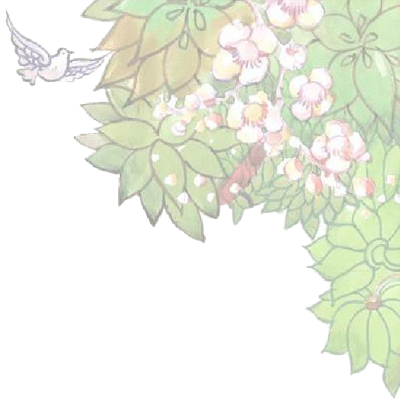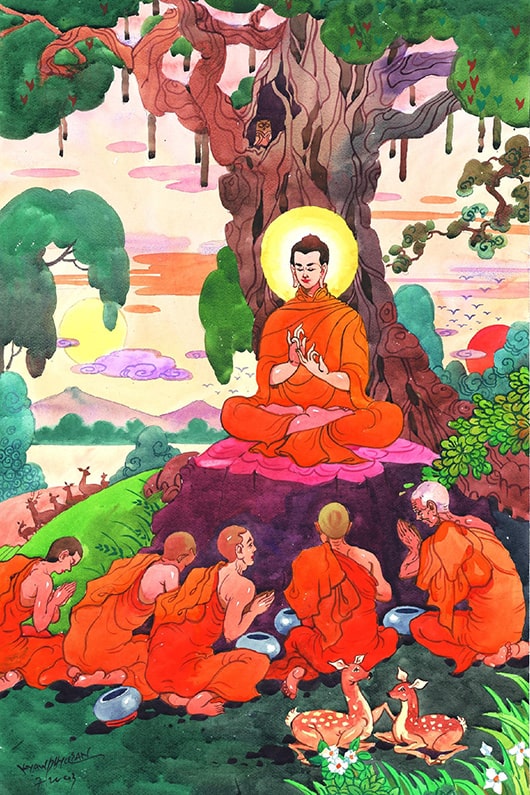23話 最初の説法 ・・・・「転法輪経」

第3部 法輪を転じる~伝道布教へ
第1章 初転法輪
23話 最初の説法 ・・・・ 「転法輪経」

二人の商人兄弟が去って行ったとき、世尊は坐っていたラージャーヤタナ樹の根もとから立ち上がり、アジャパーラ・バニヤン樹の根もとへ行った。そのとき、次のような考えが世尊に浮かんだ。
「わたしが理解したこの真理は深遠で、まことに微妙で、見がたい。単なる推論では到達できない。賢者にしか差異を見分けられないものだ。愛着に喜びを見いだす者たちには、あらゆる条件づけられたものごとの滅尽である涅槃(ニッバーナ)というこの真理の差異を見分けることはほんとうにむずかしい。万一わたしが真理を神々や人々に教えても、かれらは納得しないか、理解できないであろう。真理を神々や人々に教えるのは、わたしにはひたすら疲れるだけで、面倒なだけであろう」
世尊の心中を知って、サハンパティ梵天は、こう考えた。
「この世は失われるであろう。この世はすっかり失われるであろう。なぜなら世尊が生きとし生けるものに真理を教えないつもりなのだから」
そのとき、ちょうど、強い男が曲げた腕をさっと伸ばすか、伸ばしていた腕をさっと曲げるか、するかのように、かれは梵天界からさっと消えて、即座に世尊の前に現れた。みずからの衣を一方の肩にかけて整え、右膝を地面につけて、世尊にしっかり手を合わせて礼拝して、こういった。
「尊い方よ、世尊があらゆる生きとし生けるものに、人間に、神々に、梵天に、真理を教えられますように。尊師が憐れみをもってあらゆる生きとし生けるものに、人間に、神々に、梵天に、真理を教えられますように。眼に汚れのないものもおります。かれらは世尊の説かれる真理を聴かないことで多大の損失をこうむるでしょう。世尊が教えられる真理を理解できる者はおります」
世尊はサハンパティ梵天の勧請をきいた。そして大いなる憐れみをもって、ブッダの眼でこの世界を見渡された。幾人かは、おおまかに概略を説明するだけで真理を理解できる者もいると世尊ははっきりご覧になられた。ちょうど池のさまざまな蓮のように、水面から高く上に立ち、朝の光がさしたあと、その日のうちに花ひらくものもあるのだ。世尊はまた、幾人かは教えを受けて詳しく説明されたあとには真理を理解できる者がある、とご覧になられた。ちょうど水面に浮かんでいる蓮が次の日に花ひらくように。さらに世尊は、幾人かは有能な師に教えを受けて、実践に打ち込んでやり抜き、真理をさとるのに何日も何か月も何年もかけた後、真理を理解できる者がある、とご覧になられた。ちょうど水面下にひっそり沈んだままの蓮が三日目に花ひらくように。そしてさらに世尊は、幾人かは、今生ではついにさとらないが、真理についてたくさん聴き、実践し、未来の生存で功徳を得るであろう、とご覧になられた。ちょうど水面下に沈んだままの蓮が、水面から上に立つことなく、花ひらくこともなく、ついには魚と亀の餌になってしまうように。
こうした四種類の人々をご覧になって、世尊に真理を広く伝道したい、という熱い思いが起きてきた。
その後に世尊は、梵天勧請への同意を表明され、このように語られた。
「不死の涅槃への扉はいま開いている。わたしは生きとし生けるものに真理を説くであろう。そうすればかれらは信を持ち、善き聴聞をして、ひとしく功徳を得るかも知れない」
遍歴行者ウパカと出会う
それから世尊は、真理を教えてほしいという梵天の勧請を受けいれたあと、よく考えてみた。
「まず、誰に、わたしは真理(ダンマ)を最初に教えるのだろうか? 誰がこの真理(ダンマ)をすぐ理解するだろうか?」
それから、こうも考えた。
「アーラーラ・カーラーマは賢明で、学識があり、見識がある。かれはまた長いあいだ眼にほとんど塵埃がなかった。もしわたしが真理を最初にかれに教えたら、かれはたちまち理解するだろう」
しかしそのとき、眼には見えない神が世尊に語りかけた。
「尊い方よ、アーラーラ・カーラーマは七日前に亡くなりました」
世尊はすぐさま、そのとおりだ、とわかった。
それから世尊は、もう一人の師であったウッダカ・ラーマプッタのことを考えたが、またもや眼には見えない神が世尊に、かれは昨夜亡くなった、と語りかけた。そのとおりだ、と知って、世尊は両方の師が亡くなったのはたいへんな損失だ、と考えた。なぜなら、もし、かれらが真理(ダンマ)をきけば、たちまち理解するはずであったからである。
最後に世尊は、ウルヴェーラーの森で苦行の実践をしていたころ、仕えてくれた五人の行者のことを考えた。そして神聖にして清浄、人の視力をはるかに凌駕している世尊の天眼で、かれらがバーラーナシー(ベナレス)のイシパタナ(訳注:仙人集会所、高度な修行を積んだ行者たちのたまり場)の鹿野苑(ミガダーヤ、鹿の園)にいるとわかった。このようにして世尊はウルヴェーラーの森に望む限りのあいだ滞在した後、十八ヨージャナ離れたバーラーナシーへ歩いて行ったのである。
この途中、菩提(ボーディ)樹とガヤーの中間で、世尊は遍歴行者のウパカに出会った。世尊のたたずまいを見た途端、ウパカはびっくりして、そして聞いた。
「あなたの挙措動作は落ちつきがあって穏やかです、友よ。あなたのお顔は冴えざえとして明るい。どなたのもとで修行されたのですか? あなたの師は誰ですか? 誰の教えを信仰されているのですか?」
こういわれて、世尊が答えられた。
「わたしは一切を超越した。だから一切を知る全知者である。
わたしは一切のものごとから離れた。だから一切からの解脱者である。
わたしは一切の渇愛を滅尽して、わたしはしっかり涅槃に確立した。
わたしはみずからの智慧によって一切を理解した。他の誰を師と呼ぶべきであろうか?」
「わたしに師はいない。わたしに比肩する者はない。
神々をふくむこの世界に、わたしに匹敵する者はない。
わたしはこの世界の阿羅漢である。
わたしは比類なく、卓越した天人師(神々と人間の先生)である。
わたしは正自覚者である。
煩悩の火をわたしは消尽した。
わたしはいまカーシ国の町に行き、真理の輪(法輪)を回し(転じ)始める。
この盲闇に包まれた世界で、わたしは不死の太鼓を打ち鳴らすであろう」
世尊の発言を聞くやいなや、ウパカ行者はこう尋ねた。
「もし、あなたのいうことがほんとうだとしたら、では友よ、自分は無限の勝利者だ、といいたいのですか?」
すると世尊は答えられた。
「わたしのような勝利者は、ウパカよ、煩悩の消尽を達成した者たちである。わたしは一切の悪しき諸法に勝利した。そのことをもってわたしは勝利者と呼ばれるのだ」
その後すぐに、ウパカ行者は短く、こう言った。
「そうかも知れませんね、友よ!」
かれは首を振ってうなずき、脇道をとって、去った。
五人の行者と出会う
ウパカとの問答の後、世尊はバーラーナシーへの旅を順を追ってつづけた。紀元前588年のアーサーラー月(現代暦の七月ごろ)の満月の日の涼しい夕方、世尊は仙人集会所(イシパタナ)の非常に大きな鹿の園である鹿野苑(ミガダーヤ)に到着した。
そのとき五人の行者(五群(パンチャヴァッギヤー)行者)は世尊がやってくるのを見て、かれらのあいだでこんなふうに申し合わせた。
「見ろ、友よ! ゴータマ行者がやってくるぞ。かれは苦しい修行を放棄して、放逸になってしまい、安易で気楽な生活に逆戻りした。話しかけるのはやめよう。そしてお辞儀するのさえやめよう! かれの鉢と外衣を受けとる必要はない。そればかりか席を用意することもない。坐りたければ坐ってもいいが、さもなければ立たせておけばいい! かれみたいなだらしない行者に仕えて、誰が喜ぶだろうか?」
しかし世尊がしだいに近づいてくるにつれて、ウルヴェーラーの森で六年間仕えたゴータマ行者とは似ても似つかない、とかれらは気づいた。世尊のからだは、比類なく輝き、静けさにみちて、穏やかな印象が感じられるのである。かれらのうちの誰も何が起きているのかわからず、一致したはずの合意を守ることはできなかった。かれらはただちに立ち上がった。そのうちの一人が世尊に近づいて世尊の鉢と外衣をとり、別の一人が席を用意し、また別の者たちが足を洗うための水と足台とタオルを準備した。そして世尊が坐られた後、礼拝して「友よ(アーヴソー)!」と歓迎したのである。
それから世尊は、かれらに語りかけた。
「おお五群(パンチャヴァッギヤー)たちよ、わたしに、名前であるとか『友よ(アーヴソー)』とか、呼びかけてはならない! わたしは修行を完成し、完全にさとりをひらいた。聴け、おお五群(パンチャヴァッギヤー)たちよ、わたしは不死を実現したのだ。わたしはそなたたちに真理を教え、示すであろう。もし、そなたたちがわたしの教えに従い、実践するなら、そなたたちはすぐにも聖なる修行の究極の目的を実現し、まさにこの生存で、生と死を超越するであろう」
そのすぐ後に、五人の行者は答えた。
「友ゴータマよ、あなたがなしとげた最も難しい苦行の実践でさえも、人間の状態より高度な聖者の智慧と洞察にふさわしい明らかなちがいを達成していない。苦しい修行を放棄した後、安楽で快適に暮らして、あなたはどのようにして、そんな高度な状態を達成できたのですか?」
そのとき世尊が答えた。
「わたしは苦しい修行を放棄していないし、安楽で快適に暮らしてもいない。よく聴きなさい! わたしは不死を実現したのだ。わたしはそなたたちに真理を教え、示すであろう。もし、そなたたちがわたしの教えに従い、実践するなら、そなたたちはすぐにも聖なる修行の究極の目的を実現し、まさにこの生存で、生と死を超越するであろう」
二度目も三度目も、五人の行者は世尊に同じ事をいって、そのたびに世尊は同じ答えをした。とうとう世尊は尋ねた。
「五群(パンチャヴァッギヤー)たちよ、わたしがおまえたちに、このように話したことが以前あったであろうか?」
「いいえ、尊い方よ」
五人の行者は、なかった、と認めた。かくしてかれらは世尊を信頼したのである。そのときかれらは沈黙して坐り、世尊から教えを受ける準備ができたのだ。
最初の仏弟子-五比丘
世尊は最初の説法をした。真理の輪(法輪)を回し(転じ)始める説法「転法(ダンマチャッカ)輪経(パヴァッタナ スッタ)」である。この説法のなかで、世尊は五人の行者に、二つの極端な修行があり、それはわがままな快楽行と、みずから苦難を求める苦行で、世を捨てている者は両方とも避けるべきである、と説かれた。世尊は中道の実践を指示されたのだ。八つの要素からなる「聖(アリヤ)なる八支の道(アッタンギカ マッガ)(八正道)」である。世尊はまた「四聖諦(チャッターリ アリヤ サッチャーニ)」を三転十二行相(訳注:四聖諦それぞれに示転、勧転、証転の三種の観察を合計十二回行う。理論的な理解の示転、その実践の勧転、そして、その体得の証転によって如実知見を実現する)とともに説かれた。
五人の行者は注意深く聴き、世尊の教えに心をひらいた。そしてこの説法を聴いている最中に、純粋で無垢な真理(ダンマ)の洞察がコンダンニャに生じた。かれはこう理解したのだ。
「およそ生じる性質をもつものは、すべて滅する性質をもつ」
(Yaṃ kiñci samudayadhammaṃ sabbaṃ taṃ nirodhadhammaṃ)
かくてかれは説法の終わりに四聖諦を洞察し、さとりの最初の階梯である預流(ソーターパッティ)に達したのである。それゆえ、かれはまた「さとった(アンニャータ)コンダンニャ」として知られた。そのとき、かれは世尊の許しを求め、仏弟子としての出家(具足戒(ウパサンパダー))を懇願した。それに応じて世尊は戒を授け「来たれ、比丘よ! 法(ダンマ)はよく説かれた。聖なる清浄行をして苦の完全な滅尽に導け」と説かれた。このようにしてかれはブッダの教え(サーサナー)で「来たれ(エーヒ)比丘(ビック)具足戒(ウパサンパダー)」(善来比丘具足戒)によって最初の比丘となったのである。
つづけて、他の三比丘が托鉢に出かけているあいだに、世尊はワッパ、バッディアに法(ダンマ)を説いた。かれらの心は清まり、預流(ソーターパッティ)の階梯に達した。ただちにかれらは世尊の許しを求め、比丘としての出家を要請した。それに続く日、マハーナーマとアッサジもまた法を洞察し、預流者(ソーターパンナ)となった。そして遅滞なくかれらもまた世尊の許しを求め、比丘としての出家を要請した。かくて五人の行者は世尊の最初の仏弟子として五比丘となり、「五群(パンチャヴァッギヤー)比丘(ビックー)」としても知られている。そのとき以来、「比丘(ビック)僧団(サンガ)」が成立したのである。
註釈書によると、ワッパは預流果に達して、サーワナ月の満月が欠けていく最初の日に比丘出家した。バッディアはその二日目に、マハーナーマは三日目に、アッサジは四日目に、それぞれ比丘出家した。
五比丘が預流者として確立したあと、世尊は五日目に「無我相経(アナッタラッカナ スッタ)」を説かれた。世尊と、高貴な五比丘のあいだの問答を解説したものだ。その核心は、世尊が色(ルーパ)受(ヴェーダナー)想(サンニャー)行(サンカーラー)識(ヴィンニャーナ)の五蘊は無常である、そして無常は苦(ドゥッカ)(不満足)である、と述べられたのである。それから、これら無常、苦であるどんなものも変化していくもので、正しい理解(正知)によって次のようにありのまま見るべきである、と。
「これは、わたしのものではない。 (n’etaṃ mama)
これは、わたしではない。 (n’eso’ hamasmi)
これは、わたしそのものではない。(na m’eso attā)」
世尊の言葉をきいて五比丘は満足し、喜んだ。そして世尊がこの説法をしたとき、かれらの心は煩悩から解脱し、執着がなくなった。かれらは阿羅漢になったのである。
※ 画像やテキストの無断使用はご遠慮ください。/ All rights reserved.

Episode 23
SETTING THE WHEEL OF DHAMMA IN MOTION
A Request to Teach the Dhamma
When the two merchant brothers had gone away, the Blessed One rose from His seat under the rājāyatana tree and went to the ajapāla banyan tree. Then, such a thought arose in him: “This Dhamma that I have comprehended is profound, it is indeed subtle and hard to see; it is not attainable by mere ratiocination; it can be discerned only by the wise. It is indeed hard for such a generation who finds delight in attachment to discern this Dhamma, the extinction of all conditioned things, Nibbāna. If I were to teach the Dhamma to such devas and humans, they would not see or understand. To teach the Dhamma to such devas and humans will be only tiresome and troublesome for me.”
Knowing the Blessed One’s mind, Brahmā Sahampati thought: “The world
will be lost; the world will be utterly lost, for the Blessed One does not intend to teach the Dhamma to sentient beings.”
Then, just as a strong man might stretch out his bent arm or bend his
outstretched arm, he vanished from the brahmā world and instantly appeared before the Blessed One. Having arranged his robe on one shoulder and placed his right knee on the ground, he paid homage to the Blessed One by raising his clasped hands and said: “Lord, may the Blessed One teach the Dhamma to all sentient beings, humans, devas and brahmās. May the Sublime One, out of compassion, teach the Dhamma to
all sentient beings, humans, devas and brahmās. There are beings, with little dust on their eyes, who will suffer a great loss by not listening to the Dhamma of the Blessed One. There are those who can comprehend the Dhamma taught by the Blessed One.”
The Blessed One listened to Brahmā Sahampati‘s pleading. And out of great compassion, He surveyed the world with the eye of a Buddha. He clearly saw that there were some individuals who could understand the Dhamma, even though it were expounded in a brief outline—just as among the various kinds of lotuses in a pond, some would stand aloft above the water and would bloom forth that very day after being touched by the morning sunshine. The Blessed One also saw some individuals who could understand the Dhamma after being taught and explained in detail—just as some lotuses which are afloat on the water surface would bloom forth the next day. Again, the Blessed One saw some individuals who could understand the Dhamma by being taught by competent teachers and after applying themselves persistently on the
practice and to the realisation of the Dhamma for days or months or years—just as some lotuses which were still submerged under the water, but would bloom forth on the third day. And again, the Blessed One saw some individuals who would never realise the Dhamma in this present life however much they listened to and practised the Dhamma, but they would gain the benefits in the future existence—just as some lotuses, which kept submerged under the water and neither rose from the water
nor bloomed forth, would eventually become the food for fish and tortoises.
Having seen these four kinds of individuals, the Blessed One developed an ardent desire to propagate the Dhamma. Thereafter, He expressed His approval by saying: “The doors to the deathless Nibbāna are now open. I would expound the Dhamma to all sentient beings so that they who have faith and good hearing may get the benefit equally.”
Meeting with the Wandering Ascetic Upaka
Then The Blessed One, after accepting the request to teach the Dhamma, considered: “To whom shall I first teach the Dhamma? Who will soon understand this Dhamma?” Then He thought: “Āḷāra Kālāma is wise, learned and discerning. He also has little dust on his eyes for a long time. If I taught the Dhamma first to him, he will soon understand it.” But then an invisible deva told the Blessed One: “Lord, Āḷāra
Kālāma died seven days ago.” He soon learnt that it was so.
Then, the Blessed One thought of His other teacher, Uddaka Rāmaputta, but again that invisible deva came and told Him that he died last night. Having perceived that it was so, He thought that it was a great loss for both of His former teachers because if they had heard the Dhamma, they would have soon understood it.
Finally, the Blessed One thought of the five ascetics who attended upon Him while He was engaged in the practice of austerity in the Uruvelā Forest. And with His divine eye, purified and surpassing the human vision, He learnt that they were dwelling in the Deer Park at Isipatana, the Resort of the Seers, near Bārāṇasī (Benares). Thus, after staying at Uruvelā as long as He wished, He walked to Bārāṇasī,
which was eighteen yojanas away.
On the way, between the Bodhi tree and Gayā, the Blessed One met a wandering ascetic named Upaka. On seeing the appearance of the Blessed One, he was amazed and asked: “Your faculties are serene, friend. Your complexion clear and bright. Under whom have You gone forth? Who is Your teacher? Whose doctrine do You profess?”
When this was said, the Blessed One replied:
“I have transcended all, so have I all known.
I am detached from all things, so have I all renounced.
I have abandoned all cravings and I am established securely in Nibbāna.
By My own wisdom have I comprehended all. Whom should I call My teacher?”
“I have no teacher. There is no one equal to Me.
In the world with its devas, there is no person for My peer.
I am an Arahant in this world.
I am the Teacher of humans and devas, incomparable and excellent.
I am the Supremely Self-Enlightened One.
Fire of defilements have I extinguished.
I go to the City of Kāsi now to set the Wheel of Dhamma in motion.
In this blindfolded world, I shall go and beat the Drum of Deathlessness.”
On hearing the Blessed One’s utterances, the ascetic Upaka enquired:
“If what You say is true, then friend, do You claim yourself a Limitless Conqueror?”
Then the Blessed One replied: “The conquerors like Me, Upaka, are those who have attained the extinction of defilements. I have conquered all states of evil. It is for that I am called a Conqueror.”
Thereupon, the ascetic Upaka remarked: “It may be so, friend!” He nodded his head, took a side track and departed.
Meeting With the Five Ascetics
After the dialogue with Upaka, the Blessed One continued his journey by stages to Bārāṇasī. In the cool evening of a full-moon day of Āsāḷha, in the year 588 B.C., He arrived in Migadāya, the huge Deer Park at Isipatana.
Then, when the five ascetics (Pañcavaggiyā) saw the Blessed One coming, they agreed among themselves: “Friends, look! The ascetic Gotama is coming. He has given up the struggle, became self-indulgent and reverted to an easy and comfortable life. Let’s not speak to Him nor even pay respect to Him! It is not necessary for us to receive His bowl and His outer robe. Nevertheless, a seat can be prepared. He may
sit there if He so wishes, otherwise let Him stand! Who would be pleased to attend upon a lax ascetic like Him?”
But when the Blessed One was getting nearer and nearer, they began to notice that He did not look like the ascetic Gotama whom they had attended upon in the Uruvelā Forest for six years. They found that His body was incomparably brilliant, and they also felt such a serene and peaceful impression coming from Him. None of them knew what was happening as they were unable to keep their agreement. They
immediately rose up. One of them approached Him by taking His bowl and outer robe; another prepared a seat; the others set out water, footstool and towel for washing His feet. And after the Blessed One sat down, they paid respect and greeted Him: “Friend (āvuso)!”
Then, the Blessed One told them: “O Pañcavaggiyā, do not address me by name or as ‘āvuso’! I have been accomplished and fully Enlightened. Listen, O Pañcavaggiyā, I have realised the Deathlessness. I shall instruct and teach you the Dhamma. If you follow and practise according to My instruction, you will soon realise the supreme goal of the holy life and transcend birth and death in this very life.”
Thereupon, the five ascetics replied: “Friend Gotama, even with the most difficult practice of austerity which You had done, You achieved no distinction higher than the human state worthy of the noble ones’ knowledge and vision. How is it possible that You, after giving up the struggle, being self-indulgent and living in ease and comfort, attain such a high state?”
Then, the Blessed One replied: “I am neither giving up the struggle, nor am I being self-indulgent and living in ease and comfort. Listen attentively! I have realised the Deathlessness. I shall instruct and teach you the Dhamma. If you follow and practise according to My instruction, you will soon realise the supreme goal of the holy life and transcend birth and death in this very life.”
For the second and the third time, the five ascetics said the same thing to Him, and everytime the Blessed One gave the same answer. Finally, the Blessed One asked: “Pañcavaggiyā, have you ever known Me to speak like this before?”
“No, Lord,” the five ascetics admitted. Thus, they were convinced by the Blessed One. Then, they sat down in silence, ready to receive instruction from Him.
The First Five Disciples
The Blessed One delivered His first discourse, the Dhammacakkappavattana Sutta (The Discourse on Setting the Wheel of Dhamma in Motion). In this discourse, the Blessed One expounded to the five ascetics that there are two extremes—self-indulgence and self-mortification—which should be avoided by one who has renounced the world. He showed the practice of the middle path consisting of
eight factors, the Noble Eightfold Path (Ariya Aṭṭhaṅgika Magga). He also expounded the Four Noble Truths (Cattāri Ariya Saccāni), with their three aspects and twelve modes.
The five ascetics listened attentively and opened their hearts to His Teachings. And while this discourse was being delivered, the spotless and immaculate vision of the Dhamma arose in Koṇḍañña. He comprehended: “Whatever is subject to arising is destined to cease (yaṁ kiñci samudayadhammaṁ sabbaṁ taṁ nirodhadhammaṁ).” Thus, he penetrated the Four Noble Truths and attained the first stage of sainthood (Sotāpatti) at the end of the discourse. Therefore, he was also known as Aññāta Koṇḍañña—Koṇḍañña who knows. Then, he asked for higher ordination (upasampadā) under the Blessed One. Accordingly, the Blessed One ordained him, saying: “Come, bhikkhu! The Dhamma is well proclaimed. Lead the holy life for the complete ending of suffering.” Thus, he became the first bhikkhu in the Buddha Sāsanā by way of the
Ehi Bhikkhu Upasampadā ordination.
Subsequently, while the other three went on for alms-round, the Blessed One taught and instructed Vappa and Bhaddiya on the Dhamma. They were purified and attained the stage of Sotāpatti. Immediately, they requested to be ordained as bhikkhus under Him. In the following day, Mahānāma and Assaji also penetrated the Dhamma and became Sotāpannas. And without delay, they also asked for higher ordination from the Blessed One and became bhikkhus. Thus, the five ascetics
became His first five bhikkhu disciples, also known as the “Pañcavaggiyā Bhikkhūs”. Since then, the Order of Bhikkhus—the “Bhikkhu Saṁgha”—was established.
According to the Commentary, Vappa attained the Fruition of Sotāpatti and was ordained as a bhikkhu on the first day of the waning moon of Sāvana; Bhaddiya on the second day; Mahānāma on the third day; and Assaji on the fourth day.
After the five bhikkhus were established as Sotāpannas, on the fifth day the Blessed One delivered the Anattalakkhaṇa Sutta (The Discourse on the Non-Self Characteristics), expounded as questions and answers between the Blessed One and His five noble disciples. In essence, He mentioned that corporeality (rūpa), feeling (vedanā), perception (saññā), mental formations (saṅkhārā), and consciousness (viññāṇa) are impermanent; and what is impermanent is unsatisfactory (dukkha). Then, any of these—which are impermanent, unsatisfactory, and subject to change—should be seen as they really are by right understanding: “This is not mine (n’etaṁ mama); this is not I (n’eso’hamasmi); this is not my self (na m’eso attā).”
On hearing His words, the five bhikkhus were glad and delighted. And when the Blessed One expounded this discourse, their minds were liberated from defilements, without clinging; they reached the stage of Arahantship.
※ 画像やテキストの無断使用はご遠慮ください。/ All rights reserved.
アシン・クサラダンマ長老
1966年11月21日、インドネシア中部のジャワ州テマングン生まれ。中国系インドネシア人。テマングンは近くに3000メートル級の山々が聳え、山々に囲まれた小さな町。世界遺産のボロブドゥール寺院やディエン高原など観光地にも2,3時間で行ける比較的涼しい土地という。インドネシア・バンドゥンのパラヤンガン大学経済学部(経営学専攻)卒業後、首都ジャカルタのプラセトエイヤ・モレヤ経済ビジネス・スクールで財政学を修め、修士号を取得して卒業後、2年弱、民間企業勤務。1998年インドネシア・テーラワーダ(上座)仏教サンガで沙弥出家し、見習い僧に。詳しく見る
奥田 昭則
1949年徳島県生まれ。日本テーラワーダ仏教協会会員。東京大学仏文科卒。毎日新聞記者として奈良、広島、神戸の各支局、大阪本社の社会部、学芸部、神戸支局編集委員などを経て大阪本社編集局編集委員。1982年の1年間米国の地方紙で研修遊学。2017年ミャンマーに渡り、比丘出家。詳しく見る

※ 画像やテキストの無断使用はご遠慮ください。
All rights reserved.

